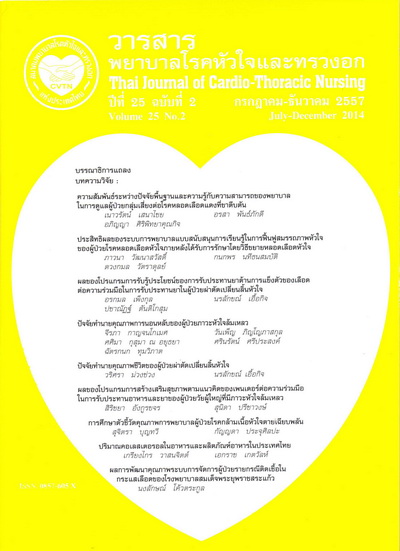ผลของโปรแกรมการสร้างเสริมสุขภาพตามแนวคิดของเพนเดอร์ต่อความร่วมมือในการรับประทานอาหารและยาของผู้ป่วย วัยผู้ใหญ่ที่มีภาวะหัวใจล้มเหลว
Keywords:
การสร้างเสริมสุขภาพ, หัวใจล้มเหลว, ความร่วมมือในการรักษา, Health Promoting, Heart Failure, Drug AdherenceAbstract
การวิจัยกึ่งทดลองแบบ 2 กลุ่ม วัดผลก่อนและหลังการทดลอง มีวัตถุประสงค์เพื่อศึกษาผลของโปรแกรมการสร้างเสริมสุขภาพตามแนวคิดของเพนเดอร์ต่อความร่วมมือในการรับประทานอาหารและยาของผู้ป่วยที่มีภาวะหัวใจล้มเหลว คัดเลือกกลุ่มตัวอย่างเป็นผู้ป่วยวัยผู้ใหญ่ที่มีภาวะหัวใจล้มเหลวที่มีผู้ดูแลหลักที่มาใช้บริการ ในโรงพยาบาลระดับตติยภูมิแห่งหนึ่ง จังหวัดนนทบุรี จำนวน 50 คน แบ่งเป็นกลุ่มทดลองและกลุ่มควบคุม กลุ่มละ 25 คน กลุ่มทดลองเข้าร่วมโปรแกรมการสร้างเสริมสุขภาพตามแนวคิดของเพนเดอร์ ประกอบด้วย การมีส่วนร่วมของผู้ดูแลหลักพร้อมกับกลุ่มตัวอย่าง ในกระบวนการสอนและให้ข้อมูลเกี่ยวกับภาวะหัวใจล้มเหลว ให้ความรู้และคำแนะนำในการเลือกรับประทานอาหารอาหารที่มีเกลือต่ำ และการรักษาด้วยยา และฝึกทักษะการนับเม็ดยาเพื่อติดตามการใช้ยา ส่วนกลุ่มควบคุมจะได้รับการดูแลตามปกติ เก็บข้อมูลโดยใช้แบบประเมินความร่วมมือในการรับประทานอาหารและยาวัดก่อนและหลังการทดลอง เปรียบเทียบระหว่างกลุ่มทดลองและกลุ่มควบคุม วิเคราะห์ข้อมูลโดยใช้สถิติเชิงพรรณนาและสถิติ t – test
ผลการวิจัยพบว่า ภายหลังการทดลองกลุ่มทดลองที่เข้าร่วมโปรแกรมการสร้างเสริมสุขภาพตามแนวคิดของเพนเดอร์ มีค่าเฉลี่ยคะแนนความร่วมมือในการรับประทานอาหารและยาเพิ่มขึ้นอย่างมีนัยสำคัญทางสถิติ (p < .05) และ พบว่า กลุ่มที่เข้าร่วมโปแกรมการสร้างเสริมสุขภาพตามแนวคิดของเพนเดอร์ มีค่าเฉลี่ยคะแนนความร่วมมือในการรับประทานอาหารและยาสูงกว่ากลุ่มที่ได้รับการดูแลตามปกติอย่างมีนัยสำคัญทางสถิติ (p < .05
ข้อเสนอแนะ : พยาบาลควรนำโปรแกรมการส่งเสริมสุขภาพนี้ไปประยุกต์ใช้เพื่อให้ผู้ป่วยที่มีภาวะหัวใจล้มเหลวมีความเข้าใจและให้ความร่วมมือในการรับประทานอาหารและยา และพยาบาลควรส่งเสริมให้ผู้ดูแลมี ส่วนร่วมในการดูแลผู้ป่วยอย่างครอบคลุมเพื่อให้ผู้ป่วยมีพฤติกรรมการรับประทานอาหารและยาที่เหมาะสมอย่างต่อเนื่อง
The Effect of Health Promoting Program Applying
Pender’s Model on Dietary and Medication Adherence in Adult Patients with Heart Failure
The purpose of this quasi – experimental study, two group pretest – posttest design research was to examine the effect of health promoting program applying Pender’s model on dietary and medication adherence in adult patients with heart failure. Fifty patients with heart failure with caregivers, recruited from a tertiary hospital in Nontaburi, participated in this study. The participants were assigned into experimental and control group with 25 persons in each group. The control group received usual care while the experimental group participated in the health promoting program applying Pender’s model. The program consists of participation of caregivers in the process of giving health information of heart failure, assessment, giving information, skills training on dietary recommendations, low salt nutrition information, medication administrations and medication count for medical adherance. Data were collected using the dietary and medication adherence questionnaire before and after intervention compared between control and experimental group. Data were analyzed using descriptive and t-test statistics.
The results showed that after participating in the program, the mean score for regimens recommendation of the experimental group was significantly higher before the intervention (p<.05). In addition, the mean score regimens recommendation for the experimental group was significantly higher than that for the control group (p<.05).
Recommendation: This program should be applied to promote understanding of dietary and medication adherence in adult patients with heart failure. In addition, nurses should promote caregivers to take care of patients comprehensively for continuous and appropriate dietary and medication adherence.
Downloads
Published
How to Cite
Issue
Section
License
บทความนี้ยังไม่เคยตีพิมพ์หรืออยู่ในระหว่างส่งไปตีพิมพ์ในวารสารอื่น ๆ มาก่อน และกองบรรณาธิการขอสงวนสิทธิ์ในการตรวจทาน และแก้ไขต้นฉบับตามเกณฑ์ของวารสาร ในกรณีที่เรื่องของท่านได้ได้รับการตีพิมพ์ในวารสารฉบับนี้ถือว่าเป็น ลิขสิทธิ์ของวารสารพยาบาลโรคหัวใจและทรวงอก






